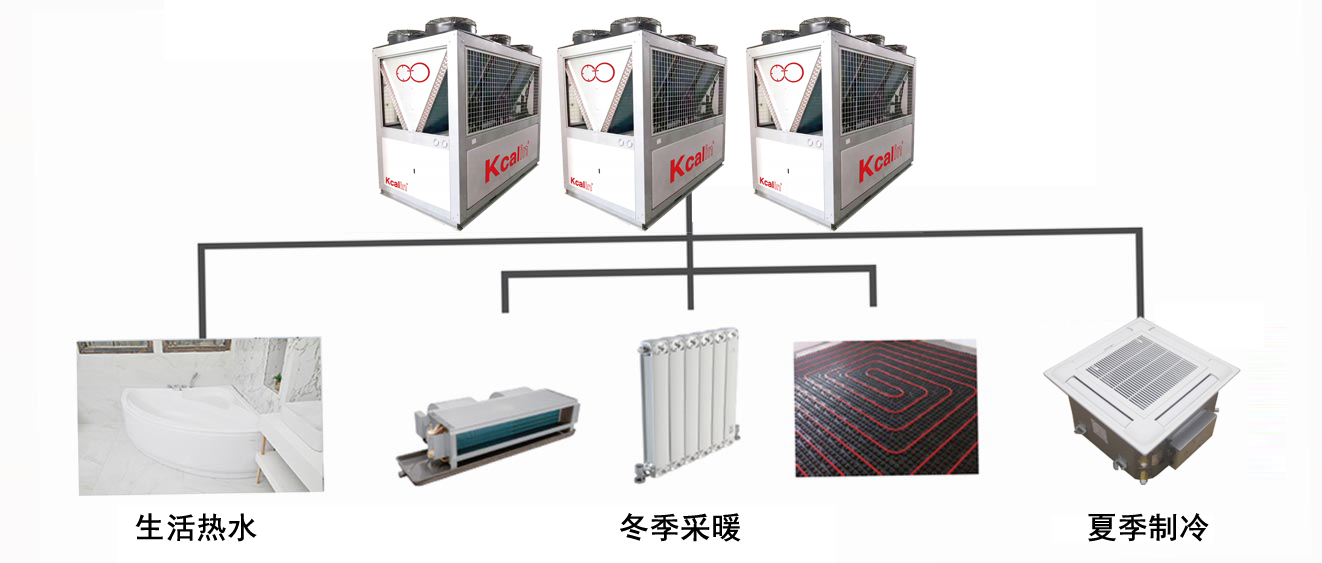With the deepening of the concept of energy conservation and environmental protection, the selection of heating equipment has become particularly important. Among numerous heating schemes, electric heating boilers and air source heat pumps have become popular choices for many households and commercial places due to their respective advantages. However, when faced with these two heating methods, many people may feel confused and unsure which one is more suitable for their needs.
Characteristics of electric heating boilers
Principle and operation mode: Electric heating boilers use electric energy to heat water or other heat transfer media, and then transfer the heat to various corners of the room through pipelines. It has high heating efficiency and can quickly raise the temperature of the room to a comfortable level.
Advantage analysis: Easy installation: The installation process of electric heating boilers is relatively simple, without the need for complex pipeline laying and external equipment installation, making it particularly suitable for places that already have power supply. Accurate temperature control: Due to the highly precise temperature control system of the electric heating boiler, users can adjust the indoor temperature as needed at any time to avoid energy waste. Clean and environmentally friendly: Electric heating boilers do not produce combustion exhaust gas, so they will not cause pollution to indoor air quality and external environment.

Applicable scenarios: Electric heating boilers are suitable for small areas with high temperature control requirements, such as small residential buildings, apartments, and offices. Due to its reliance on electricity for operation, using it in areas with high electricity costs may result in higher operating expenses.
Characteristics of Air Source Heat Pump
Principle and operation mode: Air source heat pump absorbs low-temperature heat from the air, heats it up through a compressor, and delivers the heat indoors. Unlike electric heating boilers, air source heat pumps do not directly heat through electrical energy, but use the heat energy in the air to convert heat and achieve heating.
Advantage analysis: Energy saving and efficient: The energy efficiency ratio (COP) of air source heat pumps is usually between 3-5, which means that consuming 1kW of electricity can generate 3-5 kW of heat, making it have significant energy-saving advantages in long-term use. Environmental protection and emission reduction: Air source heat pumps utilize renewable air energy to reduce dependence on fossil fuels, and do not produce pollutants such as carbon dioxide during operation, meeting the requirements of green environmental protection. Suitable for all seasons: Air source heat pumps can not only provide heating, but also provide cooling services in summer, achieving multi-purpose use.
Applicable scenarios: Air source heat pumps are suitable for medium to large residential, villa, and commercial places, especially in areas where the temperature is not too low in winter. However, in extremely cold environments, the efficiency of air source heat pumps may decrease, so local climate conditions need to be considered.
Comparison of Two Heating Methods
Energy efficiency and operating costs: Air source heat pumps have significant advantages in energy efficiency, and their long-term operating costs are lower than those of electric heating boilers. Especially in areas with longer heating seasons, air source heat pumps can reduce energy consumption and save costs.
Installation and maintenance: The installation of electric heating boilers is relatively simple, with low initial investment and convenient maintenance. However, the installation of air source heat pumps is relatively complex, with high initial costs, but they have a longer operating life and lower maintenance costs, making them more cost-effective in the long run.
Environmental adaptability: In extremely cold regions, electric heating boilers can maintain stable heating effects without being affected by external temperatures. Air source heat pumps may require auxiliary equipment such as electric heaters to ensure heat output in extremely low temperature environments, which can reduce their overall energy efficiency.
Environmental Protection and Comfort: Air source heat pumps have advantages in terms of environmental protection, as their operation does not produce pollutants and helps reduce carbon footprint. Both devices perform equally well in terms of comfort, providing stable indoor temperatures and ensuring a comfortable living environment.
Choosing between an electric heating boiler or an air source heat pump requires comprehensive consideration of the following factors:
Geographical location and climate conditions: If you live in an area with relatively cold winters and have high requirements for stable heating, an electric heating boiler may be a better choice. On the contrary, if the winter in your area is mild and there is a longer heating season, air source heat pumps will be a more energy-efficient choice.
Budget and long-term operating costs: If the budget is limited and quick installation is required, electric heating boilers are a more economical choice. For users who pursue long-term cost-effectiveness and are willing to undertake higher initial investments, air source heat pumps will be more attractive.
Environmental friendliness: If environmental protection is your top priority, air source heat pumps, with their low-carbon and environmentally friendly characteristics, will be your better choice.
Both electric heating boilers and air source heat pumps have their advantages and applicable scenarios. The choice should be based on your specific needs, living environment, and budget. By comparing the advantages and disadvantages of two heating methods, you can choose the heating system that suits your situation, thereby achieving an efficient, comfortable, and environmentally friendly living experience.







Comment